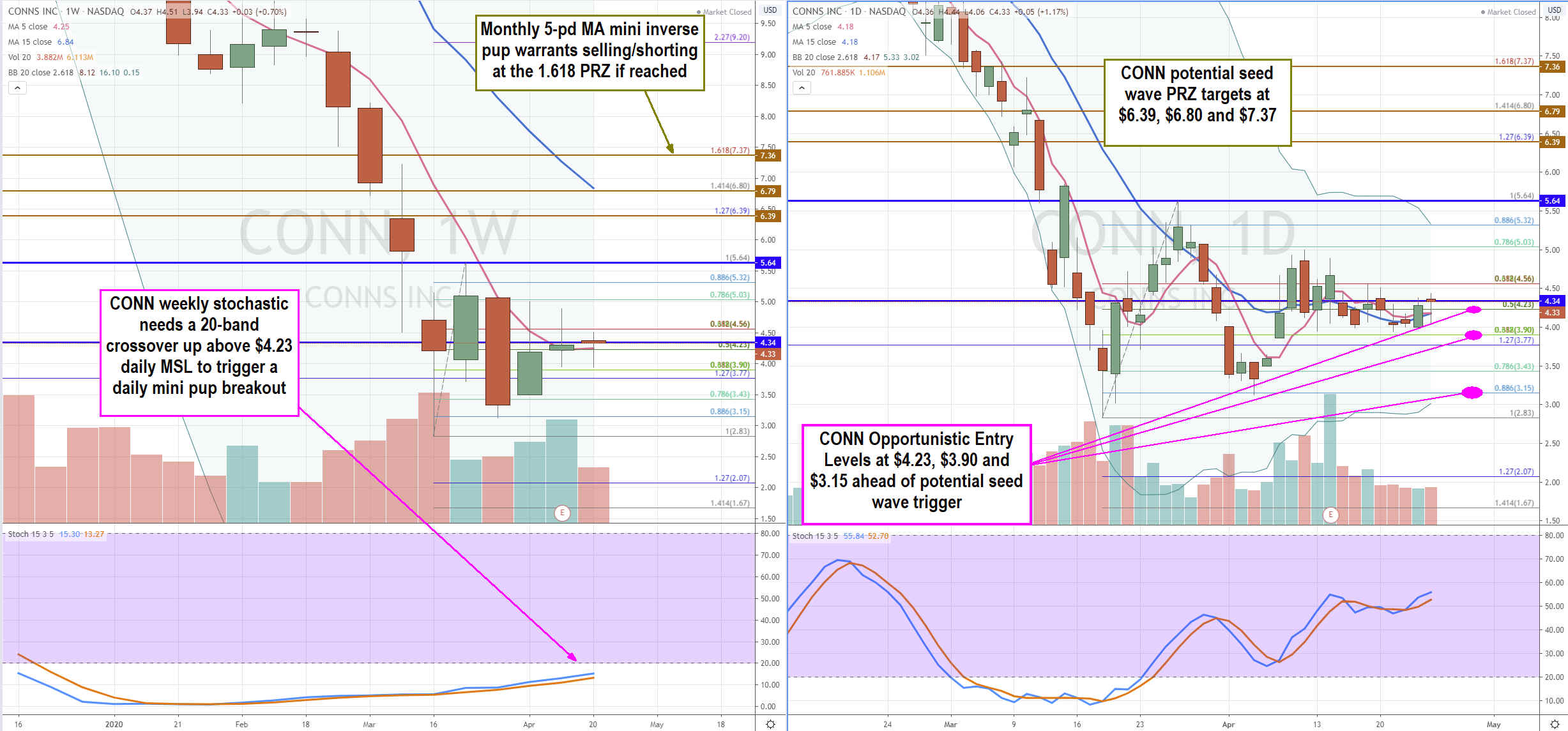Specialty electronics and furniture retailer
Conn’s (NASDAQ: CONN) stock has been hit hard during the COVID-19 pandemic. With a customer base of lower credit score consumers, investors have been concerned with rising customer credit delinquencies and defaults. Shares have been on a slow grinding sell-off since peaking at $27.57 in September 2019 only to accelerate to lows of $2.83 on March 18, 2020, when the
S&P 500 (NYSEARCA: SPY) finally bottomed off a (-34%) descent off its highs. While problems continue to plague Conn’s, the market may have overdone its sell-off thus presenting a value buying opportunity for prudent investors and nimble traders. There is a technical pattern forming on the daily called a seed wave, which presents three potential upside targets upon triggering.
Q4 FY2020 Earnings Results
On April 9th, Conn’s reported their Q4 fiscal 2020 earnings report for the period ended Jan. 31, 2020. Topline revenues fell (-4.6%) to $413 million and bottom-line EPS missed by (-$0.15) at $0.20 versus $0.35 consensus analyst estimates. Results were “disappointing” as management revealed declining credit trends and difficulties in collection efforts under the new loan management system. This resulted in an increase in first payment defaults, 60-plus day delinquencies, and re-aged balances in turn resulting in higher charge-offs. Credit spreads declined to 790 basis points (bps) versus 890 bps year-over-year (YoY). Credit segment loss was (-$28.6 million pre-tax) compared to (-$16.2 million pre-tax) YoY. The credit statement loss primarily was due to the $13.9 million YoY increase in bad debt provisions.
However, the company believes those issues are in the rearview mirror with the resignation of John Davis, president of Credit and Collections in March 2020. They initiated tighter underwriting standards which did impact same-store sales by 3% to 4% in Q4. Residual impacts from Hurricane Harvey still plagued Q4. Strong sales in appliances and e-commerce were able to improve margins to 40% despite lower sales.
Pandemic Defensive Measures
While most stores remain operational with reduced hours through the COVID-19 crisis as of April 14, 2020, the company increased frontline employee wages by $2-per hour, which reducing certain executives and officer salaries by (-20% to -25%). Starting in March, the company implemented underwriting changes to remove high risk applicants while implementing payment relief programs for customers facing COVID-19 hardships. Conn’s plans to open 6 to 8 showrooms down from 16 to 18 showrooms this year. The stay-at-home mandates have bolstered sales of essential home appliances and home office products partially offsetting weaker demand for furniture. The company beefed up its cash position in mid-March by borrowing $275 million from its revolver. As of April 14, the company has approximately $400 million of liquidity ($270 million in cash and $120 million remaining revolver).
Ahead of the Restart Narrative Curve
Conn’s CFO, George Bchara made interesting remarks pointing out that their stores remain “profitable” despite significantly lower revenues. On average, stores fall to “breakeven” when retail revenues drop nearly 60% from YoY levels. On April 21st, Director Douglas Martin purchased $59,000 worth of CONN shares. Shares are trading at a price-earnings (P/E) ratio of 2.32 compared to a 11.35 P/E YoY. The company is still profitable and operating most of its stores which gives this one a nice lead on the restart narrative ahead of competitor Best Buy (NYSE: BBY), whose stores still remain temporarily closed limited to curbside pickups. BBY shares have rallied well off their lows leaving CONN shares as a laggard.

Opportunistic Buy Levels
Using the rifle charts on wider time frames to lay out the playing field is suitable for swing traders and investors. CONN is not a pretty chart but attempting to recover with a weekly stochastic cross up mini pup that needs to breakout through the 20-band. The daily formed a market structure low (MSL) trigger above $4.34. The weekly MSL triggers above $5.64, which can also trigger a potential daily seed wave pattern that forms when two sequentially higher MSLs form. This sets up three potential price reversal zone (PRZ) targets at $6.39 (1.27 fib extension), $6.79 (1.414) and $7.26 (1.618 final fib and monthly 5-pd moving average). It is worth noting that if CONN reaches the 1.618 PRZ, investors should consider taking profits since the monthly stochastic is in a bearish mini inverse pup. Meanwhile, the opportunistic entry levels sit at $4.23 Fibonacci (fib) level , $3.90 fib and $3.15 daily lower Bollinger Bands and fib. Nimble traders can scalp these levels initially for reversion and then with intraday trend. Swing traders can scale for overnight to multi-day holds. Long-term investors may consider a dollar-cost averaging approach with income generation through writing covered calls.
Before you make your next trade, you'll want to hear this.
MarketBeat keeps track of Wall Street's top-rated and best performing research analysts and the stocks they recommend to their clients on a daily basis.
Our team has identified the five stocks that top analysts are quietly whispering to their clients to buy now before the broader market catches on... and none of the big name stocks were on the list.
They believe these five stocks are the five best companies for investors to buy now...
See The Five Stocks Here
MarketBeat just released its list of 10 cheap stocks that have been overlooked by the market and may be seriously undervalued. Enter your email address and below to see which companies made the list.
Get This Free Report
Like this article? Share it with a colleague.
Link copied to clipboard.